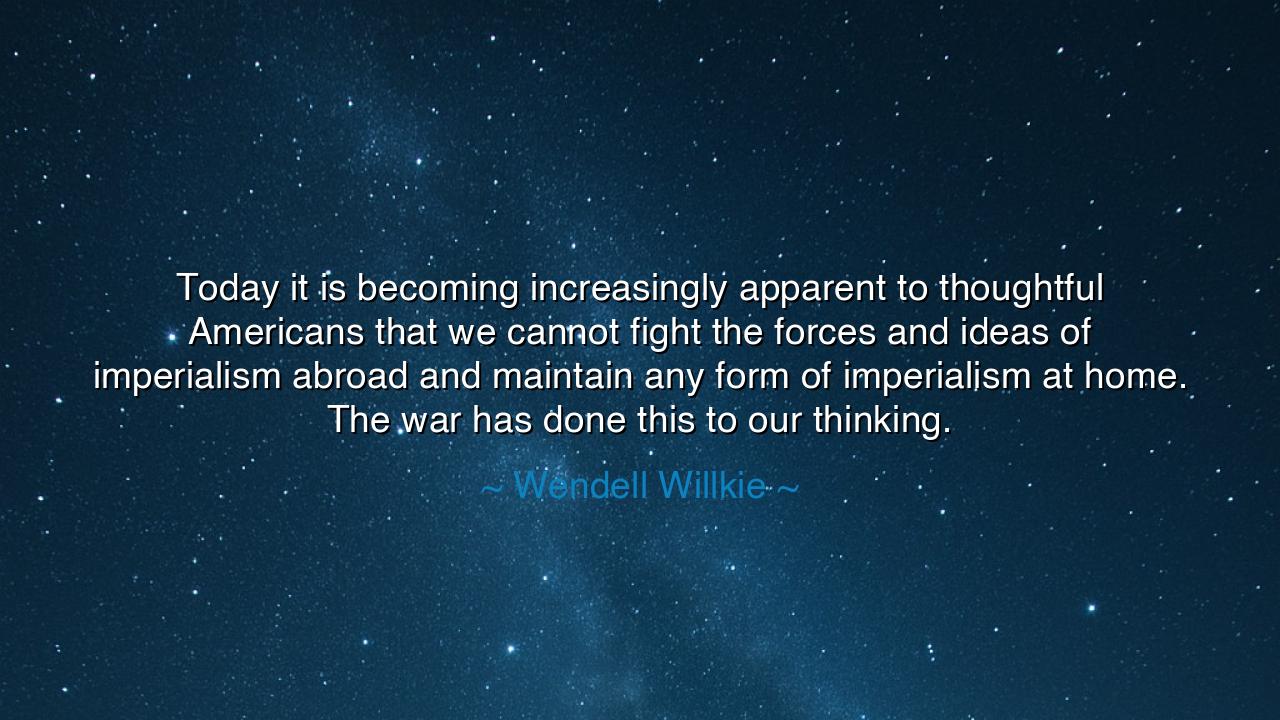
Today it is becoming increasingly apparent to thoughtful
Today it is becoming increasingly apparent to thoughtful Americans that we cannot fight the forces and ideas of imperialism abroad and maintain any form of imperialism at home. The war has done this to our thinking.






In the solemn yet stirring words of Wendell Willkie, a voice of conscience in an age of war, we hear both warning and awakening: “Today it is becoming increasingly apparent to thoughtful Americans that we cannot fight the forces and ideas of imperialism abroad and maintain any form of imperialism at home. The war has done this to our thinking.” These words, spoken in the shadow of the Second World War, are more than a political reflection—they are a moral revelation. They remind us that the battles waged upon the fields of Europe and Asia are not only fought with weapons, but with ideas—and that hypocrisy, even in victory, corrupts the soul of a nation.
Wendell Willkie, once the Republican challenger to Franklin D. Roosevelt, spoke these words after traveling the world during the war. He had seen nations bled dry under the yoke of imperialism, their people starved of freedom in the name of civilization. He saw that America, while fighting against tyranny abroad, still carried within its own borders the stains of inequality, segregation, and colonial rule—a contradiction that no victory could conceal. The war, with its cries for liberty and its rivers of blood, forced honest minds to see that freedom cannot be divided—that to defend liberty overseas, one must practice justice at home.
To the ancients, this principle was sacred. The Greeks who rose against the Persian empire once declared, “We fight for the right to live free, not to rule others.” Yet even Athens, that cradle of democracy, later fell to the corruption of empire, enslaving the very peoples it once sought to liberate. And in that decay lies the same truth that Willkie spoke to his countrymen: a nation that preaches freedom but practices domination invites its own moral ruin. Imperialism, whether draped in the flag or masked as order, is a poison that seeps inward—it conquers the conqueror from within.
Willkie’s words came in an age when the United States stood on the brink of global leadership. Its armies had crossed oceans, its ideals filled the airwaves, and its victory seemed to promise a new dawn. But the wise man saw deeper. He saw that America’s strength would not be measured by the number of enemies it defeated, but by whether it could conquer its own prejudices—its treatment of minorities, its oppression in the colonies, its arrogance toward smaller nations. For he understood that moral power is greater than military power, and that the truest victory is to live without contradiction between what one proclaims and what one practices.
Consider the fate of other empires. Rome, the mighty, spoke of civilization and peace, yet crushed its neighbors beneath iron legions. The British Empire claimed to bring enlightenment, yet bound millions in servitude. Their might was vast, their rhetoric noble, yet both fell—not by external conquest, but by the decay that comes when justice is spoken with the lips and denied by the hands. So too did Willkie warn that if America became a liberator abroad but an oppressor at home, it would inherit the same curse. His was a voice of prophetic foresight, echoing the ancient belief that justice is indivisible: to betray it anywhere is to wound it everywhere.
The war, he said, “has done this to our thinking.” War, in its terrible clarity, stripped away illusion. It showed that freedom is not a luxury, but a necessity—that those who fight tyranny must first purge it from their own souls. When American soldiers died on foreign soil for the idea of liberty, their sacrifice demanded more than words—it demanded transformation. The old world of empire, of racial hierarchy and colonial rule, could not survive the moral fire that war had ignited. The conscience of the age, Willkie declared, must rise to meet its destiny, or else perish in its hypocrisy.
And so, the lesson for all generations is this: one cannot defend justice selectively. If you oppose oppression in others, you must also uproot it in yourself. If you stand against tyranny, you must not tolerate it in your home, your heart, or your nation. The battle for freedom is not fought only on foreign fields; it begins within the boundaries of one’s own conscience.
Therefore, live as guardians of consistency—make your ideals whole. Let your actions be the echo of your principles. Treat no man as lesser, claim no dominion by deceit, and let no comfort justify injustice. For the downfall of every empire begins when it forgets its own creed. And remember always the wisdom of Wendell Willkie: that to fight for freedom without living it is to build victory on sand, but to live by the truth you proclaim—that is to build a nation eternal and unshakable, a light for all who dwell in the shadow of oppression.






AAdministratorAdministrator
Welcome, honored guests. Please leave a comment, we will respond soon